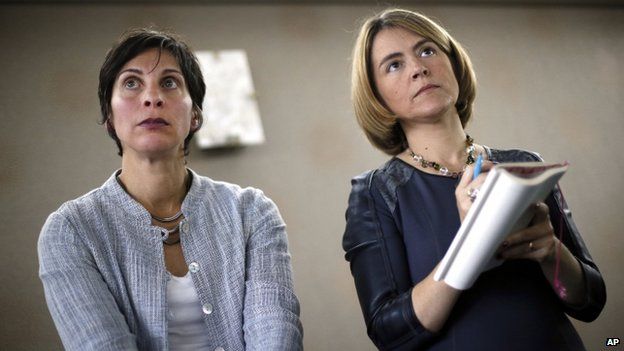UN officials criticise Detroit water shutoffs
- Published

UN human rights officials have called for Detroit to restore water service to poor customers in arrears on their bills, arguing the shutoffs discriminate against minorities.
Catarina de Albuquerque and Leilani Farha say the shutoffs hurt "the most vulnerable and poorest".
Detroit has closed the taps for more than 27,000 people this year.
Activists in Detroit had appealed to the UN for assistance in stopping the practice in the high-poverty city.
"It is contrary to human rights to disconnect water from people who simply do not have the means to pay their bills," Ms de Albuquerque, UN special rapporteur on the human right to safe drinking water and sanitation, wrote in a statement on Monday.
"I heard testimonies from poor, African-American residents of Detroit who were forced to make impossible choices - to pay the water bill or to pay their rent."
Under the city's water policy, customers more than 60 days late in payment on their water bills run the risk of having their water service shut off as the city attempts to reduce the utility's millions of dollars in debt.
The UN experts said Detroit's water utility had increased water rates by 8.7% in an effort to pass on the higher costs of leakage in ageing pipes.
That, along with the city's high unemployment rate and a decline in the overall number of customers as the city's population shrinks, rendered water bills "increasingly unaffordable to thousands of residents in Detroit living under the poverty line", Ms de Albuquerque added.
Under such conditions, Detroit's low-income and African-American populations have been disproportionally impacted, the UN finds.
"Such situations go against internationally recognised human rights standards," wrote Ms Farha, special rapporteur on housing.
The UN officials recommended the creation of a mandatory federal water and sewage affordability standard, as well as special allowances for those in "particularly vulnerable circumstances".
"The city of Detroit should restore water connections to residents unable to pay and to vulnerable groups of people including persons with disabilities, the chronically ill, and households with small children," Ms de Albuquerque wrote.
In July 2013 Detroit became the largest city to date to declare bankruptcy, citing billions of dollars in debt.
Once a symbol of US industrial power, Detroit has faced decades of decline - dropping in population from nearly two million residents in 1950 to about 700,000 in 2012 - with Michigan Governor Rick Snyder earlier declaring it "basically broke".
A judge is currently expected to rule on the city's bankruptcy exit plan in early November.
- Published21 September 2014
- Published2 September 2014